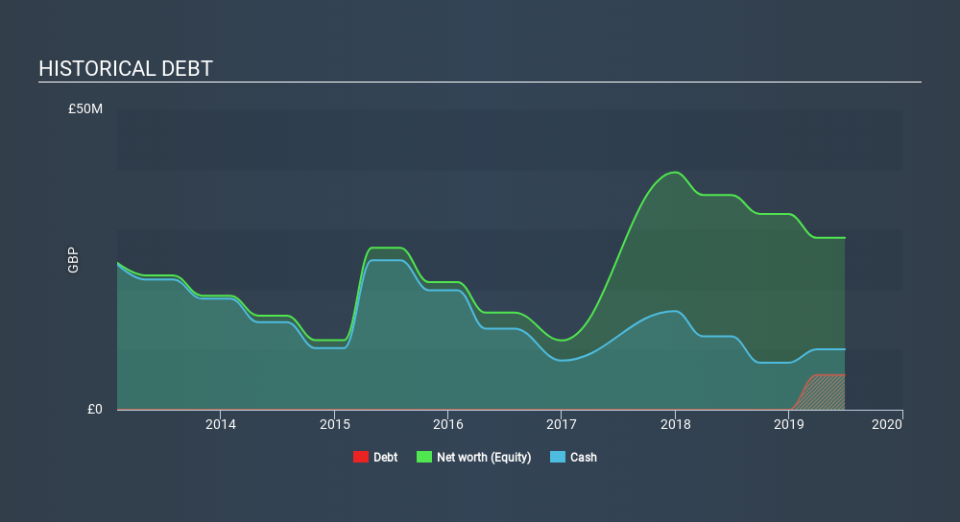Health Check: How Prudently Does Tissue Regenix Group (LON:TRX) Use Debt?

Some say volatility, rather than debt, is the best way to think about risk as an investor, but Warren Buffett famously said that 'Volatility is far from synonymous with risk'. It's only natural to consider a company's balance sheet when you examine how risky it is, since debt is often involved when a business collapses. Importantly, Tissue Regenix Group plc (LON:TRX) does carry debt. But the real question is whether this debt is making the company risky.
Why Does Debt Bring Risk?
Debt assists a business until the business has trouble paying it off, either with new capital or with free cash flow. Ultimately, if the company can't fulfill its legal obligations to repay debt, shareholders could walk away with nothing. While that is not too common, we often do see indebted companies permanently diluting shareholders because lenders force them to raise capital at a distressed price. Of course, the upside of debt is that it often represents cheap capital, especially when it replaces dilution in a company with the ability to reinvest at high rates of return. The first step when considering a company's debt levels is to consider its cash and debt together.
See our latest analysis for Tissue Regenix Group
What Is Tissue Regenix Group's Net Debt?
As you can see below, at the end of June 2019, Tissue Regenix Group had UK£5.79m of debt, up from none a year ago. Click the image for more detail. But it also has UK£10.1m in cash to offset that, meaning it has UK£4.29m net cash.
How Healthy Is Tissue Regenix Group's Balance Sheet?
The latest balance sheet data shows that Tissue Regenix Group had liabilities of UK£4.11m due within a year, and liabilities of UK£6.55m falling due after that. Offsetting these obligations, it had cash of UK£10.1m as well as receivables valued at UK£3.94m due within 12 months. So it actually has UK£3.36m more liquid assets than total liabilities.
This excess liquidity suggests that Tissue Regenix Group is taking a careful approach to debt. Given it has easily adequate short term liquidity, we don't think it will have any issues with its lenders. Succinctly put, Tissue Regenix Group boasts net cash, so it's fair to say it does not have a heavy debt load! When analysing debt levels, the balance sheet is the obvious place to start. But it is future earnings, more than anything, that will determine Tissue Regenix Group's ability to maintain a healthy balance sheet going forward. So if you're focused on the future you can check out this free report showing analyst profit forecasts.
In the last year Tissue Regenix Group wasn't profitable at an EBIT level, but managed to grow its revenue by 28%, to UK£12m. Shareholders probably have their fingers crossed that it can grow its way to profits.
So How Risky Is Tissue Regenix Group?
Statistically speaking companies that lose money are riskier than those that make money. And we do note that Tissue Regenix Group had negative earnings before interest and tax (EBIT), over the last year. Indeed, in that time it burnt through UK£6.9m of cash and made a loss of UK£7.8m. But at least it has UK£4.29m on the balance sheet to spend on growth, near-term. With very solid revenue growth in the last year, Tissue Regenix Group may be on a path to profitability. By investing before those profits, shareholders take on more risk in the hope of bigger rewards. There's no doubt that we learn most about debt from the balance sheet. However, not all investment risk resides within the balance sheet - far from it. For instance, we've identified 4 warning signs for Tissue Regenix Group that you should be aware of.
Of course, if you're the type of investor who prefers buying stocks without the burden of debt, then don't hesitate to discover our exclusive list of net cash growth stocks, today.
If you spot an error that warrants correction, please contact the editor at editorial-team@simplywallst.com. This article by Simply Wall St is general in nature. It does not constitute a recommendation to buy or sell any stock, and does not take account of your objectives, or your financial situation. Simply Wall St has no position in the stocks mentioned.
We aim to bring you long-term focused research analysis driven by fundamental data. Note that our analysis may not factor in the latest price-sensitive company announcements or qualitative material. Thank you for reading.

 Yahoo Finance
Yahoo Finance 
